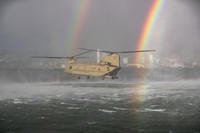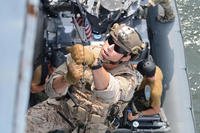On June 19, 1944, a task group from the waters off of North Africa sailed into Port Royal Bay, Bermuda. Commanded by Capt. Daniel V. Gallery, the task group consisted of one baby flattop (the USS Guadalcanal), five destroyer escorts (the Pillsbury, Chatelain, Pope, Flaherty, and Jenks), and one German submarine.
The capture of U-505 by a boarding party led by Lt. j.g. Albert L. David — the first successful boarding and capture of an enemy warship by U.S. sailors since 1815 -- remains "one of the most improbable events of the Battle of the Atlantic," Gallery said.
In previous war patrols, Gallery had noticed that a stricken sub would often surface, its crew abandon ship, and the vessel would be scuttled. The next time it happened, the commander hoped to grab and save the sub — and its valuable communication codes. He got lucky when U-505 commander Oberleutnant Harald Lange blundered into range of the Guadalcanal task force.
Hedgehog depth charges from the five destroyers forced U-505 to surface, and the Germans spilled over its side. One Pillsbury seaman recalled cries of "Comrades! Save me!" as they jumped into the Atlantic. (Remarkably, only one of the U-boat's crew drowned, and the other 59 were taken prisoner.) Meanwhile, David's party of nine boarded the hostile ship. Aware that German attempts to scuttle the boat might result in an explosion or sinking at any moment, David plunged through the conning tower hatch. His efforts earned him the Medal of Honor.
Lange had not had time to activate the scuttling devices. David's party captured all of the enemy code books, equipment (including a new type of torpedo), and maps. Because the operation was kept secret, German Admiral Doenitz did not know of his U-boat's capture until after the war — and did not change the communication codes. Unlocking these codes allowed the Allies to sink almost 300 U-boats over the war's final 11 months.














